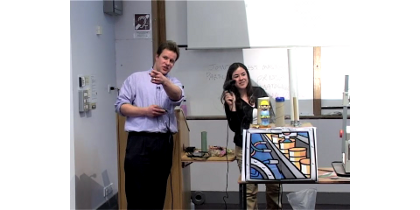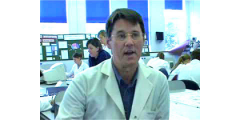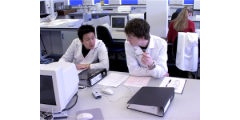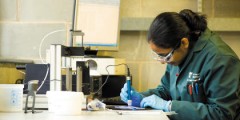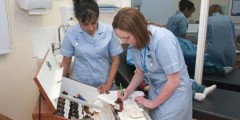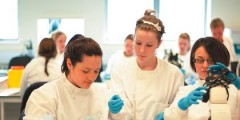Demonstrating principles using activities in lectures
January 31, 2007
Video >> Kate: “The last thing I wanted to ask you about was the demonstrations and bringing that into a classroom. What are the pros and cons of doing something like that, do you think, in terms of for the students and for the lecturer?” Ed: “The con might be that it goes wrong. There …
Classroom management and mobile phones
Video >> Martin Luck: “I think it takes a while to build up an armory of methods for dealing with these situations. How do you deal with a mobile phone when it goes off? How do you deal with late comers? How do you deal with somebody suddenly getting up and going in the middle …
Assessment: in class multiple-choice
Video >> Julian: “If they are making any errors of description then we can talk them through ‘that’s not really the gizzard that’s the ovary’. So talking them through and helping it, at the end of it we get a multiple choice questionnaire which we ask them to complete, based on both the lab and …
“Please turn on your mobile phones” – ubiquitous computing in the classroom
January 30, 2007
Mette Asmild, Andrew Jackson, Benson Lau and Nick Mount: “The adoption of the mobile telephone has revolutionised social and commercial communication in the 21st Century. Whilst it is estimated that the majority of students in British higher-education (HE) use mobile-‘phones and text/SMS-messaging, the learning benefits of adopting and supporting mobile ‘phone text-messaging communication from students …
Development and evaluation of a re-usable learning tool to supplement didactic lectures
January 29, 2007
Jo Leonardi-Bee: “The Division of Epidemiology and Public Health teaches Evidence Based Practice/Medicine (EBPM) to a variety of postgraduate courses. A common theme across these courses is to enable students to put theory from didactic lectures into practice using computer based statistical software packages. However, there are no practical sessions to accompany a particularly difficult …
An inverse method of teaching specialised subjects: decomposing a representative example to sustain analysis and interaction of details
January 16, 2007
Dragos Axinte: “The project discusses an example of teaching specialist manufacturing processes by identifying a ‘representative product’ (RP) from which key manufacturing processes can be isolated, analysed and interconnected to enable the understanding of how complex entities, i.e. products, are generated and made functional. “Teaching specialist manufacturing subjects is nowadays a challenge due to fast …
Interprofessional teaching of communication skills
September 12, 2006
Simon Conroy, Lyneth Evans, Sujay Galen, Amy McPherson and Nick Raine-Fenning: Background “Communication skills are essential for all healthcare professionals when interacting with patients. Improving their communication skills can also lead to improved health outcomes for patients. Video feedback gives the student an opportunity for reflection, and is advocated by professional bodies in healthcare. “There …
An approach to understanding and developing undergraduate students’ research strategies
Mark Bradley, Christian Haase, Helen Hill, Katharina Lorenz, Violeta Sotirova and Lloyd Weeks: “Scholarship at university incorporates a number of practices different from the study techniques students develop to succeed at school. A key aim of this cross-disciplinary project is to understand and develop academic learning and critical thinking among our students, and to explore …
DysPEL: Dyslexia and Practice Environment Learning in Nursing
March 31, 2006
Fiona McCandless-Sugg, Jo Sanderson-Mann and Heather Wharrad: Background and Overview “Pre-registration Nursing Diploma courses require that 50% of student learning takes place in the classroom and the other 50% is achieved through practice experience in the clinical placement. There is little evidence about how dyslexia affects nurses and student nurses in workplace learning, and what …
Using laboratory classes to teach experimental design
John Harris, Martin Luck and Alan Waterfall: Background “In previous years Animal Physiology students have carried out set laboratory experiments to illustrate the effects of exercise on cardiovascular responses. These were prescriptive laboratory sessions, each resulting in a written report. The teaching team felt that many students were completing these with insufficient thought and without …

